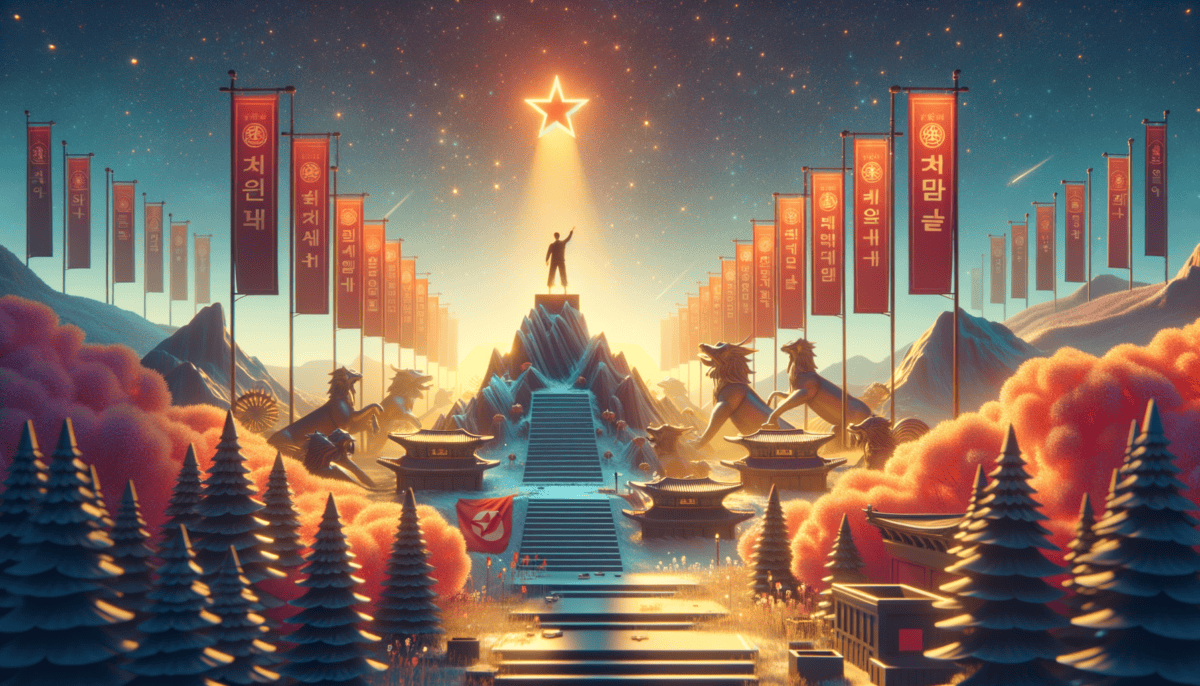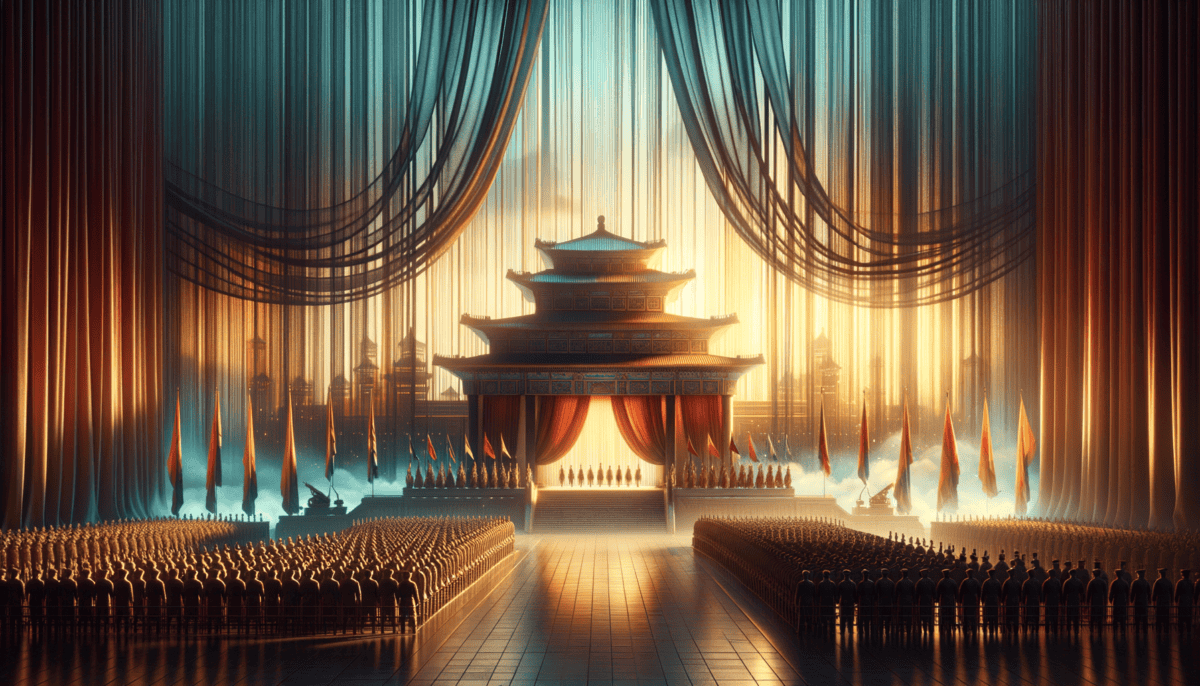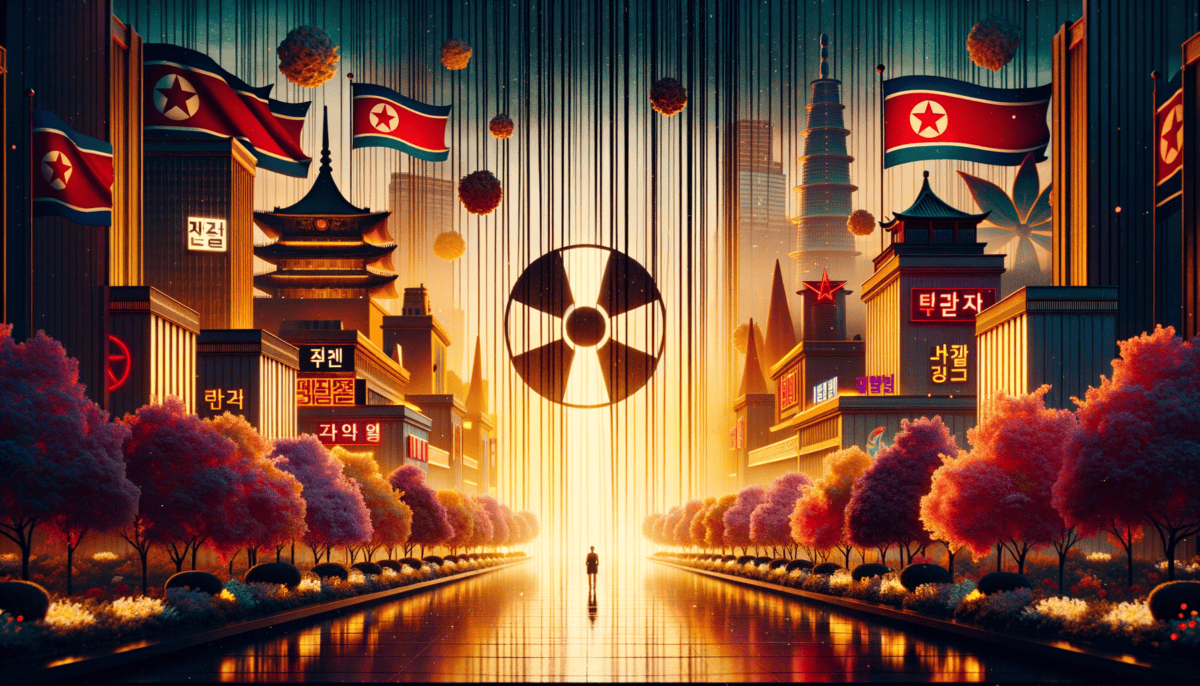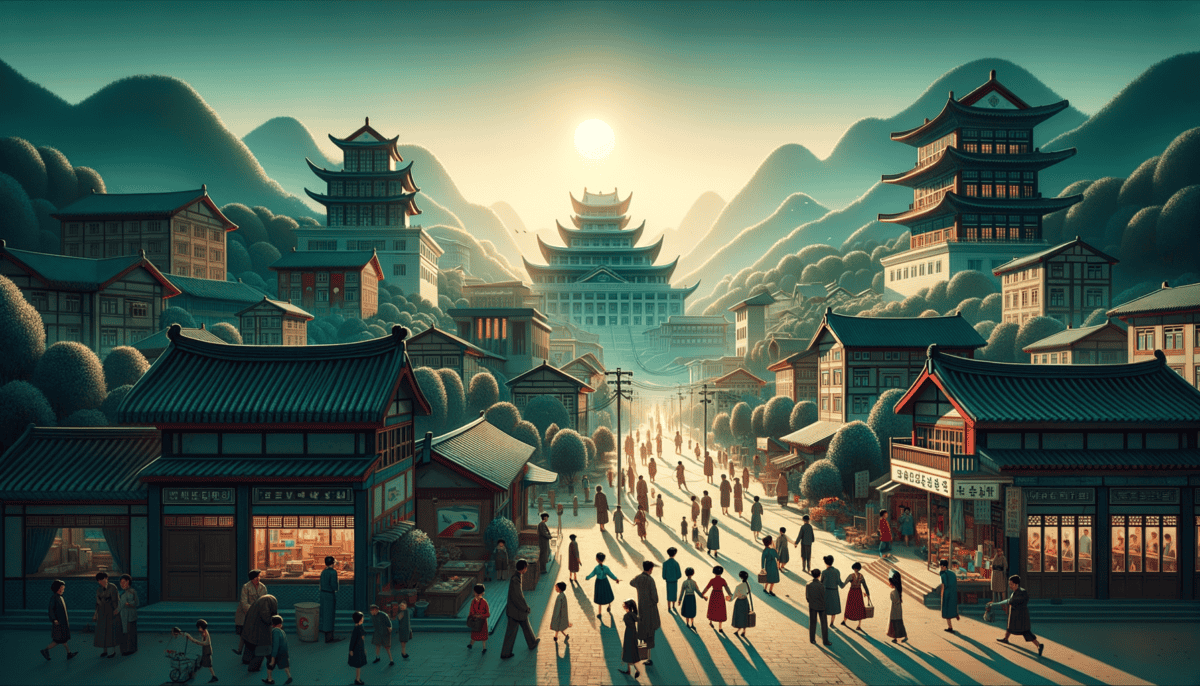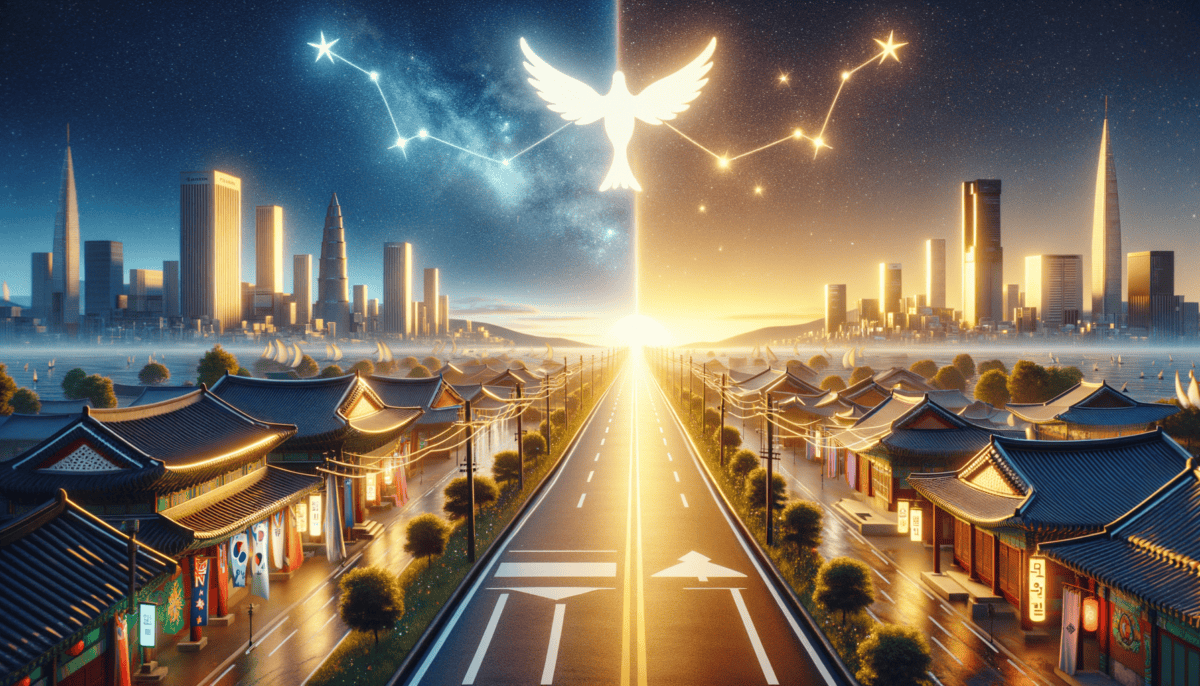A Tale of Two Koreas
Min-ji sat at her grandmother's feet, watching the old woman's hands shake as she unfolded a faded photograph. The warm evening sun peeked through their Seoul apartment window, casting long shadows across the floor.
"Tell me about the time before, Halmeoni," Min-ji pleaded, her eyes wide with curiosity.
Her grandmother smiled sadly. "Before the divide, my dear, Korea was one beautiful land. From the snowy mountains in the north to the sunny beaches in the south, we were all one family."
Min-ji scrunched her nose. "Like drawing a line through the middle of our apartment?"
"Exactly like that," Halmeoni nodded. "The Soviet Union took the north, and America stayed in the south. Nobody thought it would last forever. But it did."
The Man Who Changed Everything
"In the north, a man named Kim Il-Sung became very powerful," Halmeoni continued, her voice growing softer. "He had different ideas about how to run the country. He wanted everyone to follow his rules."
Min-ji hugged her knees to her chest. "Was he scary?"
"Some people thought he was a hero. Others were afraid. But the most important thing to remember is that he changed everything."
Two Different Worlds
The grandmother pointed to the photograph. In it, two young girls in matching hanbok dresses stood smiling, their hands clasped together.
"This is me and your great-aunt Sun-hi," she explained. "After the divide, she stayed in the North. I haven't seen her since."
• Korea split in 1945
• North went with Soviet Union
• South went with America
• Many families were separated
• The divide still exists today
"But why can't you just visit her?" Min-ji asked.
Halmeoni shook her head. "The North and South became very different places. The North closed its doors to the world, like a turtle hiding in its shell. They built big walls and fences. They made their own rules."
Life Changes
"In the South, we grew and changed. We made friends with other countries. We built tall buildings and fast trains. But the North stayed hidden away."
Min-ji touched the photograph gently. "Do you think Great-Aunt Sun-hi is okay?"
"I pray for her every day," Halmeoni whispered. "And I hope that one day, our country will be whole again."
The setting sun cast its final rays through the window, turning the old photograph golden. Min-ji leaned against her grandmother's knee, thinking about the cousin she had never met, somewhere on the other side of that invisible line.
"Will you tell me more stories about before?" Min-ji asked softly.
"Tomorrow, my dear," Halmeoni promised, carefully folding the photograph. "There are many more stories to tell about our divided land."
As night fell over Seoul, lights twinkled in the bustling city. But to the north, beyond the mountains and the invisible line, another Korea sat in darkness, waiting for tomorrow's sun.
The Rise of a New Power
The morning sun barely reached the streets of Pyongyang as young Park Ji-ho watched soldiers march past his window. The year was 1948, and everything was changing.
“Why are there so many soldiers, Papa?” Ji-ho asked, his small hands pressed against the glass.
“A new leader is coming to power,” his father whispered. “His name is Kim Il-Sung.”
A New Way of Life
Ji-ho noticed changes happening all around him. Big pictures of Kim Il-Sung appeared on walls. People started calling him the “Great Leader.” ️
“What’s happening to our neighborhood, Mama?” Ji-ho asked one evening.
His mother looked worried as she stirred their dinner. “Our country is becoming something new, little one. We must learn new ways.”
The Big Idea
In school, Ji-ho’s teacher taught them about something called “Juche.” It was a big word for a simple idea – North Korea would be strong all by itself.
• Be strong alone
• Trust your own power
• Follow the leader
• Work hard for the country
• Help each other
“Think of our country like a strong tree,” his teacher said. “We grow tall by ourselves, with our own strength.”
Changes Big and Small
Every day brought new rules. People had to go to special meetings to learn about Kim Il-Sung’s ideas. They sang songs about him and read his books.
“Papa, why does everyone clap so much when they talk about the Great Leader?” Ji-ho asked one night.
His father patted his head. “Sometimes, Ji-ho, it’s safer to clap with everyone else.”
A Different World
As months passed, Ji-ho noticed fewer cars on the streets. Some stores closed. But his teacher said they were becoming stronger by depending on themselves.
“We don’t need help from other countries,” she would say proudly. “We have everything we need right here.”
At night, Ji-ho would look out his window at the changing city. The big pictures of Kim Il-Sung seemed to watch everyone. Soldiers marched in perfect lines. People walked quickly and spoke softly.
“Remember, son,” his father said one evening, “whatever happens, we stick together. Like the morning calm, we bend with the wind but don’t break.”
Ji-ho nodded, not fully understanding but feeling the weight of his father’s words. Outside, more soldiers marched past, their boots making a steady rhythm on the pavement.
The sun set over Pyongyang, casting long shadows from the new statues and buildings. In homes across the city, families like Ji-ho’s settled in for another night in their changing world, wondering what tomorrow would bring.
In the streets, loudspeakers played songs about the Great Leader and the new nation he was building. A nation that would become unlike any other in the world.
A War Between Brothers
The summer morning of June 25, 1950, started like any other for Min-ji and her family in Seoul. But everything changed when they heard the loud booms.
“What’s that noise, Mama?” Min-ji asked, clutching her favorite doll.
“Those are tanks, sweetheart,” her mother said, pulling her away from the window. “We need to pack quickly.”
Running Away
Min-ji and her family joined many others walking south. They could only carry what fit in their bags.
“Why are we leaving, Papa?” Min-ji asked, her feet hurting from walking.
“Sometimes we have to leave to stay safe,” her father said softly. “But we’ll go back home one day.”
Help From Other Countries
Big planes started flying overhead. Ships came to the ports. Soldiers from many countries arrived to help South Korea. They wore different uniforms and spoke different languages. ️
• United States
• Britain
• Canada
• Australia
• Turkey
Separated Families
Min-ji’s uncle lived in the north. Now they couldn’t see him anymore. Many families were split apart.
“Will we ever see Uncle Jin again?” Min-ji asked her mother one night.
Her mother wiped away a tear. “I hope so, little one. I hope so.”
A Changed Land
The fighting lasted three years. Cities were broken. Fields were empty. Trains couldn’t run on broken tracks.
“Look, Papa!” Min-ji pointed at soldiers building a bridge. “They’re fixing things!”
“Yes, but some things will take longer to fix than others,” her father replied.
Two Different Koreas
When the fighting stopped in 1953, Korea stayed divided. A line called the DMZ separated the north and south. No one could cross it.
Min-ji stood with her parents, looking at the new border. “Why can’t we just erase the line?” she asked.
“Some lines,” her father said, “are drawn with more than just ink.”
At night, Min-ji would look at the stars and wonder if her uncle could see them too. The same moon shone over both parts of Korea, even if people couldn’t visit each other anymore.
The war changed everything. North and South Korea became very different places. But the people on both sides remembered when they were one country, one family.
Min-ji held her doll close as she fell asleep, dreaming of a day when all Korean families could be together again. In the distance, crickets chirped their lonely songs in a land now divided by more than just a line on a map.
The Walls Go Up
The sun barely peeked through the thick clouds as Kim Min-ho watched workers build another tall wall around Pyongyang. ️
“Why are we building so many walls, Father?” Min-ho asked, tugging at his father’s sleeve.
“To keep us safe and strong,” his father replied, but his eyes looked worried.
Big Changes
Every morning, Min-ho and his classmates now had to bow to big pictures of their leaders. ️
“Our leaders protect us,” his teacher said. “They make us strong.”
The radio only played songs about their country. The TV only showed programs about their leaders. Everything started to feel different.
Secret Projects
Deep in the mountains, workers built hidden places. Min-ho heard grown-ups whisper about something called “nuclear power.” ️
“What are they building?” Min-ho asked his mother one night.
She hushed him quickly. “Some questions are better not asked, little one.”
• No foreign movies or music
• No visitors from other countries
• Special rules about what people could say
• New strong weapons
• Different history books
Living Behind Walls
Min-ho’s friend Jun disappeared one day. When he asked about Jun, everyone looked away.
“Sometimes people go away,” his mother said softly. “We must be careful what we say and do.”
The city changed. Tall buildings went up, but many were empty. Big roads were built, but few cars drove on them.
Special Messages
Loud speakers played music and messages in the streets. Every home had a special radio that couldn’t be turned off.
“Listen carefully,” the voice would say. “Our country is the strongest and best.”
Min-ho learned to speak carefully and always smile at the right times.
Looking Out
Sometimes, Min-ho climbed to his roof at night. He could see lights far away in South Korea, twinkling like stars.
“Do they build walls too?” he whispered to himself.
His grandmother caught him once. Instead of scolding him, she sat beside him.
“The stars are the same everywhere,” she said quietly. “Remember that.”
Growing Stronger
The country focused on building weapons to feel safe. Big parades showed off rockets and tanks. Min-ho watched with mixed feelings of pride and fear.
“Are we safer now?” he asked his father.
“Safety comes in many forms,” his father answered carefully. “Some walls protect us, others keep us apart.”
At night, Min-ho dreamed of a world without walls. He imagined walking freely, talking openly, and meeting people from everywhere. But when morning came, he put on his pin with the leaders’ faces and joined the quiet crowd walking to school.
The walls kept growing taller, but so did Min-ho’s questions about the world beyond them.
Behind the Curtain
Sun-mi woke up early, just like every morning in Pyongyang. The city was already buzzing with activity.
Morning Song
“Time to wake up!” called Mom. The speaker in their apartment was playing the morning song.
Sun-mi put on her school uniform and the special pin with pictures of the leaders. Everyone had to wear this pin.
“Don’t forget to bow to the leaders’ pictures,” Mom reminded her, pointing to the wall.
School Days
At school, Sun-mi sat straight in her chair. Their teacher smiled and began the day.
“Today we learn about our great country,” she said.
The students opened their books. Every story was about their leaders and how special their country was.
• Morning exercises
• Singing patriotic songs
• Learning about leaders
• Working in community gardens
• Evening study groups
Family Time
After school, Sun-mi helped her mom prepare kimchi. Food was precious, and they saved everything.
“When I was little,” Mom whispered, “we had more choices at the stores.”
“Why not now?” Sun-mi asked.
Mom just shook her head and kept working.
Special Treats
Sometimes, Sun-mi’s family got special treats. Today, they had candy!
“Remember,” Dad said, “we’re lucky. Our leaders take care of us.”
Sun-mi noticed her parents sharing worried looks when they thought she wasn’t watching.
Hidden Stories
At night, Grandmother told stories, but very quietly. She talked about the time before the walls.
“People could travel then,” she whispered. “They could write letters to anyone.”
“Really?” Sun-mi’s eyes got big.
“Shh,” Grandmother smiled sadly. “Some memories are just for us.”
Community Life
Neighbors helped each other. They shared what they had. Everyone worked in the community garden.
“Together we are strong,” they said.
But sometimes people disappeared. Nobody talked about where they went.
Dreams and Hopes
Sun-mi watched a butterfly fly over the wall one day. She wondered where it was going.
“Can butterflies visit other countries?” she asked her friend Ji-min.
“Don’t ask such things,” Ji-min whispered. “Just watch the parade instead.”
At night, Sun-mi drew pictures in her secret notebook. She drew butterflies flying free, families sharing meals, and children playing together without walls.
The next morning, she put on her pin, straightened her uniform, and joined the morning song. But in her heart, she kept her drawings of butterflies flying free. ✨
A New Dawn
The morning sun painted Pyongyang’s sky in beautiful colors. Min-ho stood at his window, watching the city wake up.
Signs of Change
“Did you hear?” Mom asked excitedly. “They’re letting some families meet across the border!”
Min-ho’s heart jumped. His grandmother always talked about her sister in the South.
“Maybe one day,” Dad said softly, “we’ll all be one family again.”
Border Dreams
At school, Teacher Kim showed pictures of Seoul for the first time. The children gasped. ️
“It looks like magic!” whispered Young-mi.
“Our cousins live there,” another student said shyly.
• Family reunions
• Peace talks
• Cultural exchanges
• New friendships
• Shared dreams
Seeds of Tomorrow
In the community garden, old Mr. Lee planted new seeds. “These are from our friends in the South,” he smiled.
“Will they grow the same here?” Min-ho asked.
“All Korean soil is good soil,” Mr. Lee winked. “Just like all Korean hearts are good hearts.”
Bridge Builders
Young people started learning about computers and the internet in special classes.
“The world is getting smaller,” Teacher Park explained. “We need to be ready.”
Min-ho thought about all the friends he could make, all the stories he could share.
Dancing Together
The biggest surprise came when dancers from South Korea visited!
Everyone watched in wonder as they danced together – North and South, moving as one.
“See?” Grandmother whispered, wiping happy tears. “We were never truly apart in our hearts.”
Tomorrow’s Promise
That night, families gathered to watch the stars. The same stars shone over all of Korea. ⭐
“When will the walls come down?” Min-ho asked.
“They’re already starting to,” Mom smiled. “Not the big walls you can see – but the walls in people’s minds.”
Min-ho looked up at the endless sky. He thought about Sun-mi’s butterflies, now joined by thousands more, flying freely across borders that were becoming less visible every day.
As the stars twinkled above, Min-ho knew that hope was no longer just a dream. It was becoming real, one small step at a time. The future held endless possibilities, and the children of Korea – North and South – would write that story together. ✨
In gardens across the peninsula, new flowers bloomed. In classrooms, new stories were shared. And in hearts everywhere, the dream of one Korea grew stronger with each passing day.


